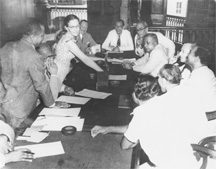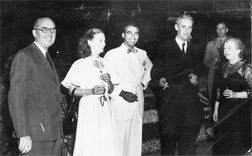Finally she attended the Cook County School of Nursing, but that career too was aborted because she opted to get married to Cheddi Jagan. She met him at the farewell function of a friend who was about to join the US Army. American nurses in those days could not marry, so Janet quit her job. They were married in 1943 and she migrated to then British Guiana despite the protests of her parents
…
“We are quite a close family, my parents, my brother and I, and I think my family came to accept my decision.
“My mother came to visit me on many occasions though she wasn’t fond of this country. I guess the reason for that is because she’s a typical American and loves her comforts.”

Though she had only been involved in politics at a student level previously, she and Cheddi quickly became busy in the affairs of the under-privileged in Guiana. “Because of the fact that my husband was from a sugar estate many people came to him for help when they were faced with difficulties because they respected his opinions.”
Organisations
In 1946, three years after she came to Guyana as Cheddi’s bride they founded with HJ Hubbard and Ashton Chase, the Political Affairs Committee, from which the PPP later emerged. In that year she also founded the Women’s Political and Economic Organi-sation that dealt with social work committees and charitable organisations. “We achieved a lot. Women could not vote unless they were literate, owned property, or were above a certain income bracket. We also fought for illiterate persons to vote by the use of symbols, like the cup symbol we use. Social and economic improvements were also on the agenda. “The Wortmanviile flats were recently completed in those days and they were very poorly constructed. As a group we protested because we felt that if houses were provided for the poor they should be proper houses, not slums. We disagreed with the dumping of milk by the Milk Distribution Centre, high prices and shortages.”

She also worked with Hubert Nathaniel Critchlow, organising domestic workers: “I can’t say we won a victory in that area because domestics were afraid of being unionised. The problem was that because they were isolated in different homes they couldn’t strike. It was also easy to fire and replace them if they ever erred.”
She stated however that the experience was an educational one for her.
When she formed the women’s arm of the PPP, the Women’s Progressive Organisation in 1953, she claimed that their struggle was “for the independence of the women and the implementation of stricter rules for their education.”
A large percentage of the young women were poorly educated, especially from the lower income brackets, because they had to leave school at a very early age to look after the younger ones while their mothers worked. The only educated young women in those days came from Bishop’s or the Convent schools. “We fought strongly for rural education,” she explained.
She was sentenced to six months in prison on civil disobedience charges in 1954 after the PPP government had been put out of power by the British. “I spent part of my sentence in the Georgetown prison and another part in the New Amsterdam jail. They tried to isolate me for fear that I would influence other prisoners.
“The food was horrible, and we weren’t allowed to accept anything from outside, except a comb and a toothbrush. Our clothes were made of flour bags and we went barefooted. We slept on canvas folding cots.”
After a while she was so bored and lonely that she requested reading material: “I guess the sort of prisoners they had in those days weren’t the type that read, but after a while they produced a box of books and asked me to arrange them. So I had the opportunity to read a lot in prison.”
She recalls that the matron of the New Amsterdam prisons was a very wonderful woman. “It’s not that she had any favourites or anything. She was also an enterprising and intelligent woman. I learnt to make the most adorable soft toys and dolls, and also to embroider.”
Later she was allowed to tutor an illiterate woman.
“In prison you see the side of people that is normally hidden in the outside world. I also got to actually enjoy the New Amsterdam prison, it was roomier than Georgetown. But the conditions were also poor, and the workers there sometimes stole the inmates’ food.”
Even though she was involved in trade unionism, protests and marches, she still had to maintain a family life, and her children grew up accustomed to her activities. She said the colonial police were something to reckon with. “I remember taking Cheddi junior to school one morning while a policeman was trailing me. When I bade him goodbye, walked up the street and looked back I saw him looking through the school window, watching the policeman trailing me.”
Among her other political achievements Janet holds claim to being the first woman to be elected to the Georgetown City Council, one of the first three women to be elected to Parliament, Member of the Legislative Council Essequibo and Minister of Health, Labour and Housing 1957-61).
“As Minister responsible for health I made a lot of strides. I visited interior locations and insisted that doctors and other health personnel accompanied me so that they could have a first hand look at what was going on, so that when hey returned to their desks they would have a fair concept of the needs of the communities.
“We stressed heavily better maternal and child care and even won an award from an overseas organisation.”
But her political involvement also brought her heartaches. “I remember when my father was dying of cancer and he asked to see me, I couldn’t return to America,” she said, a shadowed look creeping across her otherwise cheerful face.
“I was on restriction and couldn’t leave Georgetown. A few of us were restricted to certain areas. Sydney King who is now Eusi Kwayana was restricted to Buxton.
“The British wanted to break up our party at that time. There was no American Embassy in Guiana in those times, we only had a consulate so I had to go to Trinidad for a visa, but I couldn’t leave. When I left eventually it was to attend his funeral.”
Janet denies that she is the driving force behind her husband. “That is an old rumour started by the British. It had racial implications. They didn’t want to recognise my husband’s brilliance because he was black. They said that I wrote the speeches and he memorised them. But he would have had to have a prodigious memory to memorise a three hour speech.
“Cheddi certainly is the vociferous and forceful one. I remember one time he literally pushed me on to a platform to speak and I hadn’t much previous experience and was very nervous.”
Equality
She is convinced that socialism will bring equality and end exploitation.
“Even though nothing is perfect people will have a better chance of equality and justice. Socialism in the USSR brought better health and other conditions. Before that people died by the millions of starvation. Glasnost and Perestroika are also aiding them, that’s what socialism is about.”
It is her belief also that her party will get back into power as soon as there are free and fair elections, and that the economic situation in the country can be reversed. “The people are too dissatisfied with the way things are to help the government, and the country cannot recover without the full co-operation of the government.
“And the government has a ‘so what’ attitude They don’t care. If the women have to fetch water they say, ‘So what? My mother fetched water and her mother before her.’ But the dissatisfaction comes because the society is retrogressing. When I first came to Guiana there was running water and that was in the early 1940s, but now that’s a problem. People cannot buy the food they used to, nor can they build homes. Overcrowding forces them to move out of the city and there is no fuel for them to get back to the city to work.”
Apart from Cheddi Jr, popularly known as Joey, Janet is also the mother of Nadira.




